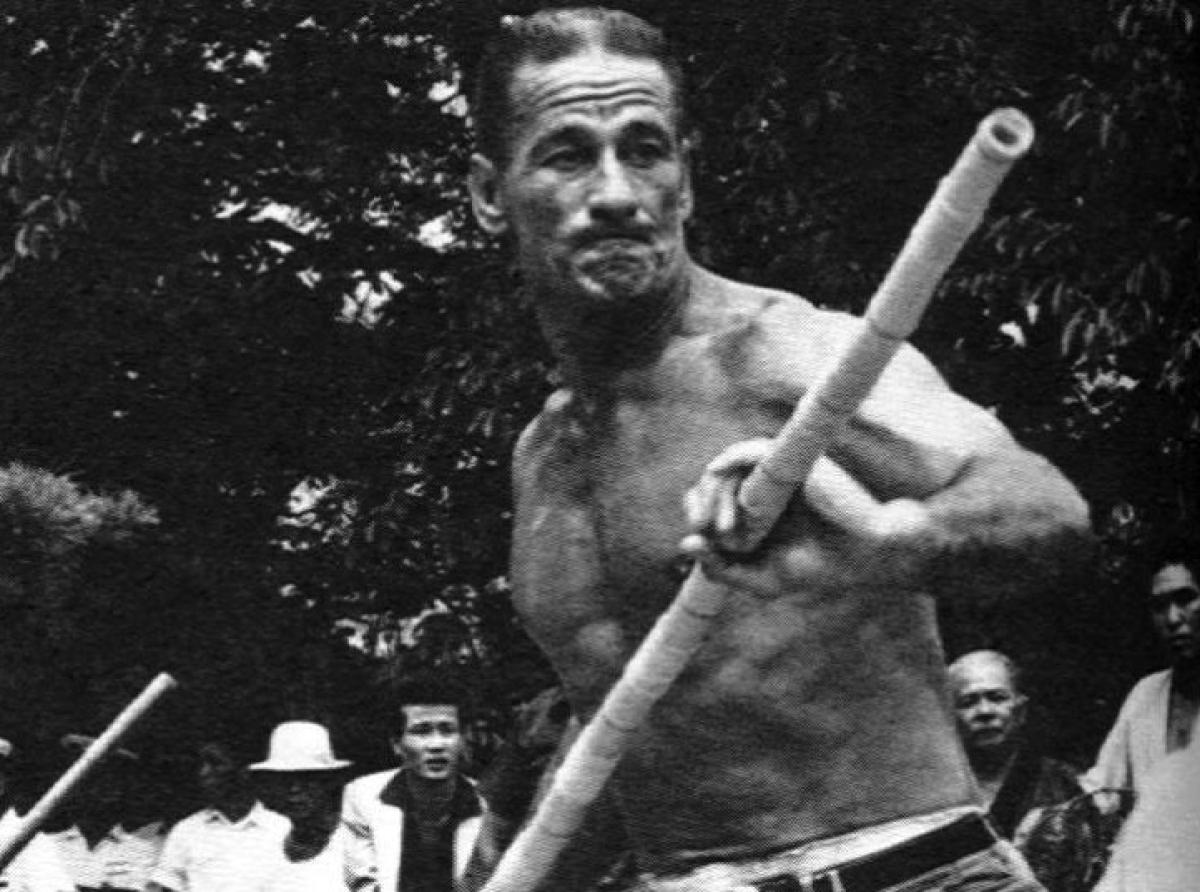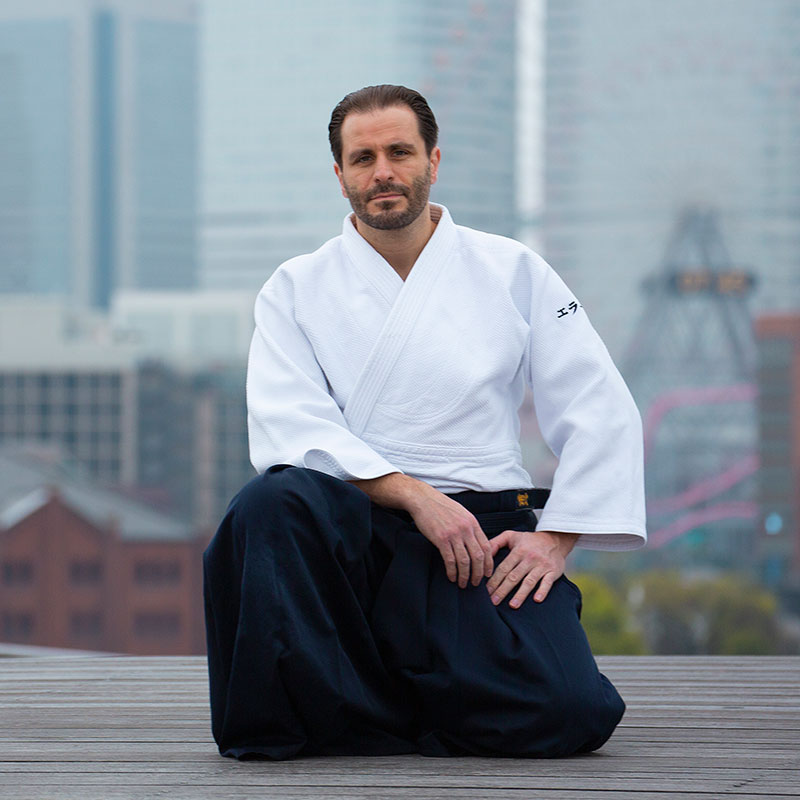Donn F. Draeger was a military veteran of WWII and Korea, a pioneer of physical training methods and a practitioner of modern Japanese martial ways (budo). He was also the first non-Japanese to study a number of classical martial arts (koryu), the author of definitive books on those arts, and the founder of a study of human combative behavior, called Hoplology. We still do now know the full extent of his achievements by his untimely death in 1982, but he was, through his perseverance, abilities and example, known even to the Japanese as, sensei.
In spite of those unprecedented, and still mostly unmatched achievements, few budo and kobudo practitioners, especially younger ones, are actually aware of the debt that they owe to Draeger, for without his efforts, they might well not have had the opportunity to study their respective disciplines. The Japanese themselves are starting to come to terms with the influence of Donn Draeger in the archipelago in helping the Japanese people keeping connected with their more ancient combat traditions.
On March 24th, 2019, a group of non-Japanese budo and kobudo researchers and practitioners working and practicing in Japan organized a unique series of lectures on Donn Draeger's impact on the martial arts community and beyond. I was asked, in collaboration with Seido's media team, to film the event and help being the content of this event to the public. You will find below a playlist which contains the four lectures that were given on that day, including the Q&A sessions.
About the speakers
Hunter ‘Chip’ Armstrong
Hunter ‘Chip’ Armstrong began training in martial arts with various karate systems in the early 60’s. On moving to Japan he continued his study under Higaonna Morio sensei (Goju-ryu) at the famous Yoyogi dojo.
Meeting Donn Draeger in 1975, Armstrong began his foray into Japan’s koryū bujutsu, starting in Shindo Muso-ryu jo at the Rembukan Dojo in Tokyo in 1977. In 1980, he began training in Tatsumi-ryu. In 1985, while living in Nagoya, he was accepted by Kato Isao Sensei to begin training in Shinkage-ryu heiho / Owari Kan-ryu sojutsu. While his main focus was in Japanese fighting arts, he also explored other arts including Chen and Yang styles of tai qi, as well as bagua and xing yi.
As first a member and then Director of the International Hoplology Society, Chip has engaged in the research and development of hoplology---the study of human combative behavior and performance---since the latter part of the 1970’s. In that endeavor, he has conducted field research in Japan, Taiwan, Hong Kong, Malaysia, Indonesia, Thailand, Sri Lanka, and India, researching both traditional fighting arts as well as modern variants.
Since 1996, Chip has been involved in developing training programs and presenting seminars for the military and law enforcement, integrating inherent principles of human combative behavior with modern combat techniques and technologies in both contexts. These principles have been present in many traditional battlefield combat systems, in particular the koryū bujutsu of Sengoku Japan, but universally found in other martial and civil fighting cultures around the world.
Chip presently resides in Sedona, Arizona State. USA
Liam Keeley
Liam Keeley was born in South Africa and began his martial arts training at the age of ten with Judo. After graduating from university he moved to Japan in 1974 to further his practice of Goju-ryu karate. Arriving in Tokyo, he began practice at the famous Yoyogi dojo of the now legendary Higaonna Morio sensei.
Liam traveled to Malaysia and Indonesia in 1979 with Donn Draeger and a team of other hoplologists learning directly from Draeger his approach to the study and classification of martial arts, weaponry and culture.
He returned to South Africa in 1980 to study anthropology, while at the same time, remarkably, learning the Mhlabatini style of Zulu stick fighting.
Returning to Japan in 1984 he began his study of Tatsumi-ryu, under Kato Takashi sensei, in which he holds the rank of Okuden Mokuroku and later began training in Toda Ha Buko ryu, under Nitta Suzuo sensei, in which he holds the rank of Shihan.
Liam has continued to promote collaboration and education in the martial arts as a member of JMAS, through organizing the first International Hoplology Conference in 1996 and more recently as a co-founder of the Koryu Collective.
Liam presently resides in Melbourne, Australia.
Alex Bennett
Dr Alexander Bennett was born in Christchurch, New Zealand, in 1970. He spent a year in Japan as part of a high school exchange program where he first experienced Kendo, leading to a lifetime’s dedication to this art.
Returning to Japan for graduate work, he received a PhD from Kyoto University (Doctor of Human and Environmental Studies) in 2001 and a second PhD from the University of Canterbury (Doctor of Philosophy in Japanese) in 2012. He has worked at the International Research Center for Japanese Studies and the Department of Japanese Studies at Teikyo University and is currently a professor in the Division of International Affairs at Kansai University.
Alex is vice president of the International Naginata Federation, a member of the International Committee of the All Japan Kendo Federation, International Committee of the All Japan Jukendo Federation, a Director of the Japanese Academy of Budo, and a head coach with NZ Kendo.
He founded and serves as editor-in-chief of Kendo World, the world’s only English-language journal dedicated to kendo and holds the grades of kendo kyoshi 7-dan, Iaido 5-dan, naginata 5-dan, tankendo 5-dan, jukendo 5-dan, and jikishin kage-ryu kenjutsu 3-dan. He also studies Tendo-ryu.
Alex is also a prolific writer in both Japanese and English on Japanese history and culture. Recent publications in English include Hagakure: The Secret Wisdom of the Samurai, Kendo: Culture of the Sword, Naginata: History and Practice, The Complete Musashi: The Book of Five Rings and Other Works, Japan: The Ultimate Samurai Guide.
Phil Relnick
Phil Relnick was born in New York State in 1938, and moved to Brooklyn, New York before the end of the Second World War. He joined the U.S. Air Force in 1955 and a year later found himself at the beginning of an unplanned, three-year tour in Japan and a life-long journey into the world of the martial arts, beginning with judo, in 1957. This journey included a 40-year on-and-off residence in Japan, and a wife and three children, between 1956 and 1998.
Returning to Japan as a civilian in 1961, Phil continued training in judo where he eventually earned the rank of 4th dan. Through an introduction from Donn Draeger, he began the study of Shinto Muso-ryu Jojutsu with Shimizu Takaji Sensei at the Rembukan Dojo and has earned the rank of Menkyo-Kaiden.
In 1978, again with Donn Draeger’s introduction, Phil began the study of Tenshin Shoden Katori Shinto-ryu with Otake Risuke Sensei at the Shinbukan Dojo and eventually, earned the rank of Shidosha Menkyo.
In addition to the technical aspects of the martial arts, Phil was a co-founder and former President of the International Jodo Federation, and founder/President of the Japan Martial Arts Society. His academic credentials include a BS in Commerce from Waseda University in Japan, and an MA in East Asian Studies (Japan) from the University of Michigan in the United States.
After returning to the United States and retirement in 1998, Phil built a dojo attached to his home, near Seattle, Washington, the Shintokan where he instructs in both koryu traditions.
Organizers
- Dr. Alex Bennett
- Antony Cundy
- Daniel Lee
- Bradford Pomeroy
Credits
- Guillaume Erard: Camera, editing, and music
- Jordy Delage & Nicolas Nothum: Camera and editing


